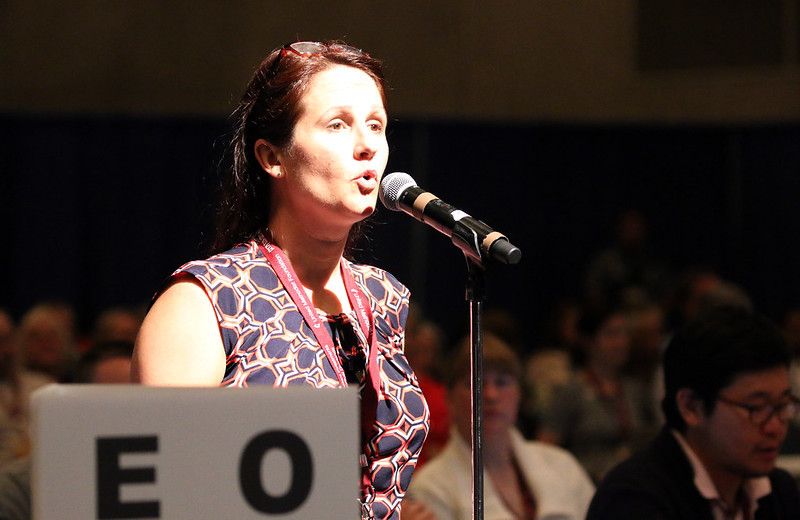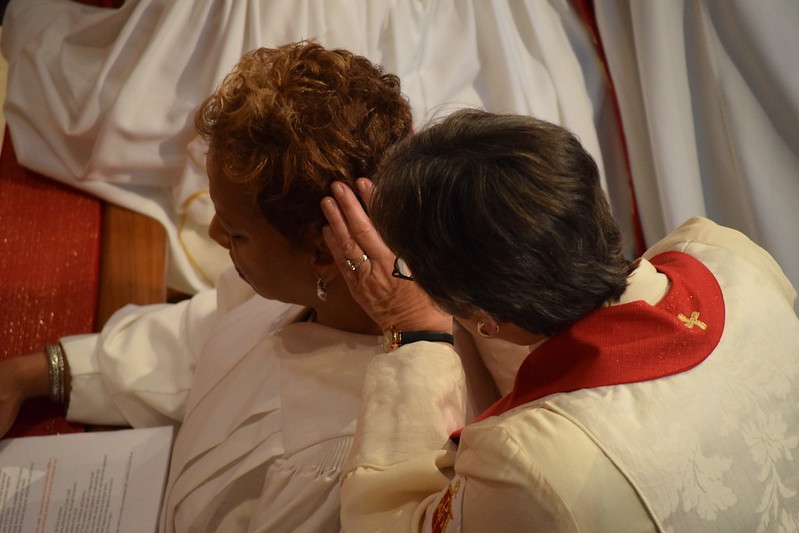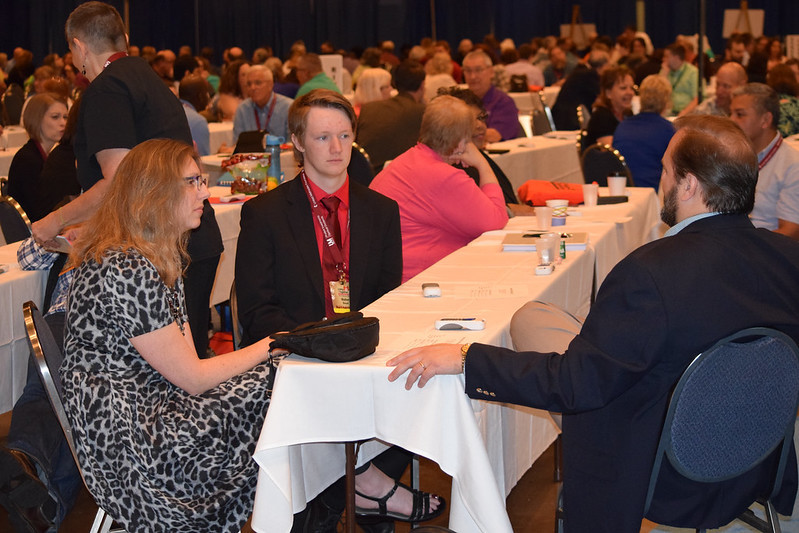
Dakotas will welcome a new bishop: North Central Jurisdiction happens this week

Rev. Rebecca Trefz speaks at the 2016 North Central Jurisdiction Conference.
With the theme "We Press On," delegates from 10 annual conferences across the Midwest will gather in Fort Wayne, Indiana, November 2-5, for a regular session of the North Central Jurisdictional Conference, where three new bishops will be elected. The Dakotas-Minnesota Area will be assigned a resident bishop.
In a quadrennium marked by postponement of 2020 jurisdictional conferences due to a global pandemic and a special NCJ session held in November 2021, delegates will gather for several business items. They will handle two of its major responsibilities – election of bishops and approval of a jurisdictional budget for the quadrennium.
Dakotas Conference delegates in attendance are Rev. Rebecca Trefz, Rev. Sara Nelson, as well as Rev. Ray Baker, reserve clergy delegate, and Rev. Jenny Hallenbeck Orr, reserve clergy delegate. Lay delegates are Kara Heagel and Beata Ferris.
Election of bishops
The first order of business will be consideration of a joint recommendation of the NCJ Committee on Episcopacy and the NCJ College of Bishops to elect three new bishops, which will assume office on Jan. 1, 2023.
A second recommendation is to have a single episcopal leader for the Dakotas and Minnesota conferences, as it was between 2016 and 2020 before retirements forced a temporary reshuffling of episcopal assignments.
Due to declining membership within the jurisdiction, it was anticipated that the NCJ College, comprised of nine episcopal areas, would be reduced to eight for the 2020-2024 quadrennium. Normally, those numbers are announced at General Conference before the start of jurisdictional conference.
When the November 2021 special session was held, delegates voted to fill only one vacancy of the two left by the retirements of Bishops Sally Dyck of the Chicago Area (Northern Illinois Conference) and Bruce Ough of the Dakotas-Minnesota Area, who both were assigned to duties with the Council of Bishops.
Bishop Laurie Haller of the Iowa Area also announced earlier in August that she will retire, effective Dec. 31, allowing a third bishop to be elected.
Since then, the Judicial Council has ruled that since General Conference did not meet and since no announcement was made, jurisdictions could use the 2016 formula for number of bishops as a guideline, meaning NCJ would maintain nine bishops through 2024.
Another factor that has led to the recommendation of three elections instead of one is that two and possibly three bishops will retire in 2024, leaving the flexibility for the jurisdiction to downsize the College of Bishops through attrition.

Bishop Deborah Kiesey, right, lays hands on Bishop Tracy Smith Malone at the 2016 NCJ Consecration Service.
Candidates for bishop
Ten persons have announced their candidacy for bishop.
The field of 10 includes the following:
- Rev. Todd D. Anderson, West Ohio
- Rev. Kennetha Bigham-Tsai, Michigan
- Rev. Dr. Curtis Brown, Illinois Great Rivers
- Rev. Jacques Conway, Northern Illinois
- Rev. Cara E. Stultz Costello, East Ohio
- Rev. Dr. Aleze Fulbright, Indiana
- Rev. Dr. Lanette Plambeck, Iowa
- Rev. Jonathan Priebe, East Ohio
- Rev. Luis Felipe Reyes, Northern Illinois
- Rev. Dan Schwerin,Wisconsin
Balloting will be in the morning session on Nov. 2, beginning at 10 a.m. EST and continuing throughout the plenaries each day until the number of persons elected matches the number of vacancies. To be elected, a candidate must garner 60 percent of the vote on any one ballot. Information on each candidate can be found on the NCJ website here. Click the name of the candidate, and the candidate’s information will appear.
Future episcopal areas
Delegates will hear a report from the Committee on Episcopacy about future episcopal areas. Due to the membership decline and an anticipated reduction brought about by churches disaffiliating, the committee is making the following recommendations:
- The Northern Illinois and Wisconsin conferences and East and West Ohio conferences begin conversation
with one another about sharing a bishop. All annual conferences begin conversation about sharing episcopal areas in the future.
- A Role of Episcopacy in the NCJ Task Force be formed and charged with bringing its findings and proposals to
the 2024 jurisdictional conference.
Re-creating a Jurisdictional Committee on Ministry
Delegates will also consider the re-establishment of a Jurisdictional Committee on Ministry as provided by ¶535 of the Book of Discipline (2016). The proposal comes from the chairs of Conference Committees on Ministry and the presidents of seminaries located within the NCJ.
The committee would be seen as:
- Being a conduit for sharing of best practices and resources among chairs of Conference Boards of Ministry;
- Being a source of information on clergy available to be appointed outside their home conferences to fill missional needs as clergy withdrawals and church disaffiliations impact the landscape of clergy supply and demand;
- Providing clarity for NCJ seminaries regarding the content and character of required education for clergy and expectations of Conference Boards of Ministry

Rev. Jenny Hallenbeck Orr, left, listens during a discussion at the 2016 North Central Jurisdiction Conference.
Code of ethics for delegates
A proposed Code of Ethics for delegates will also be considered in the plenary session. The legislation is seeking NCJ endorsement for consideration by the 2024 General Conference.
The provision at the heart of this proposal addresses conflicts of interest, which may exist for delegates elected to General Conference while being involved with disaffiliation matters before departing.
“In dealing with matters affecting the General Conference and Jurisdictional Conference, delegates shall act in good faith and in the best interests of The United Methodist Church, If delegates have an actual or potential conflict of interest, they shall disclose the conflict to the appropriate individual or group of individuals within the General Conference and Jurisdictional delegations and recuse themselves from any discussions and decisions related to the conflict of interest. This is consistent with ethical standards for members of all United Methodist general boards and agencies (BOD ¶702.2, ¶710.2).”
Conversations on white nationalism, gun violence
Two major presentations and discussions among delegates will tackle the issues of white nationalism and gun violence.
The first presentation, “Impact of White Supremacy and Christian Nationalism/White Nationalism with The United Methodist Church,” will be Thursday afternoon, and the presentation on Gun Violence will be before the Friday lunch break, with conversation continuing during the lunch recess.
Other services and highlights
A retiree recognition for Bishops Dyck, Ough and Haller will be held at 4 p.m. Thursday with a special offering for the United Methodist Committee on Relief’s Migration Project.
The Service of Consecration will take place Saturday, at 10 a.m. EST, with Bishop Dyck preaching. Assignments of bishops to areas beginning Jan. 1, 2023, will then be announced. A reception will follow at 11:45 a.m.
The Dakotas Conference Communications team will be reporting on the events as they happen from Fort Wayne. To keep up-to-date, follow us on Twitter, Facebook, and Instagram.
Watch the livestram of the conference here.
For more information about the conference, visit ncjumc.org.